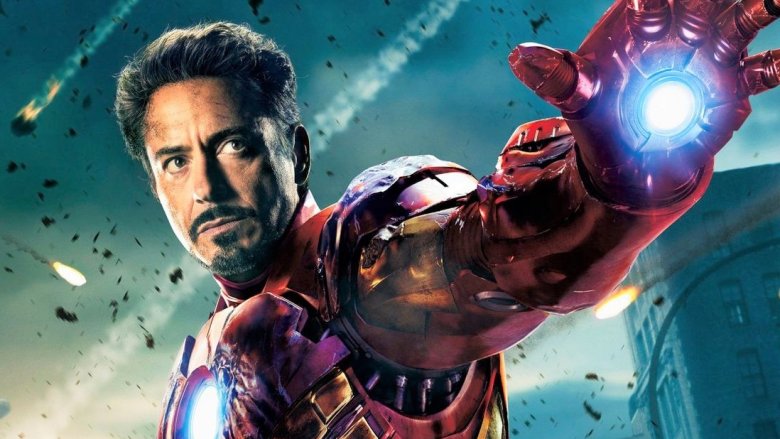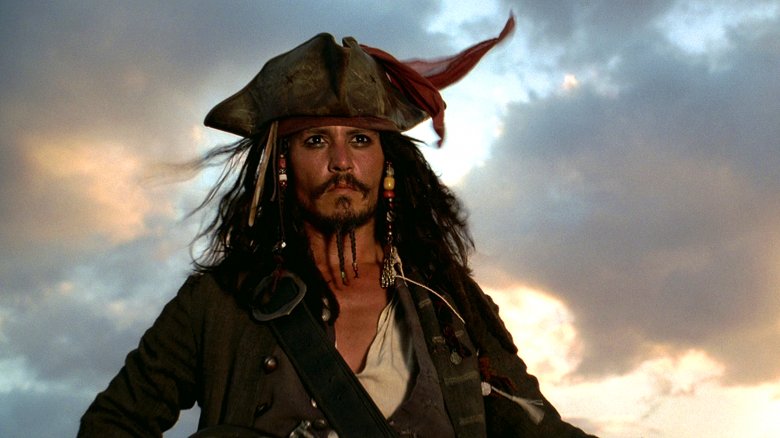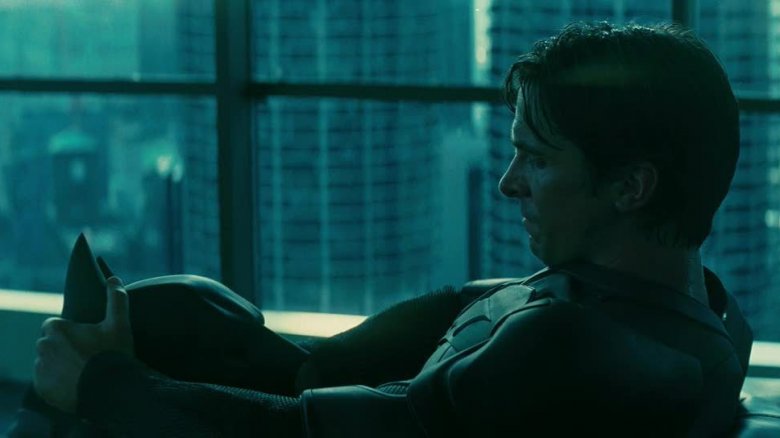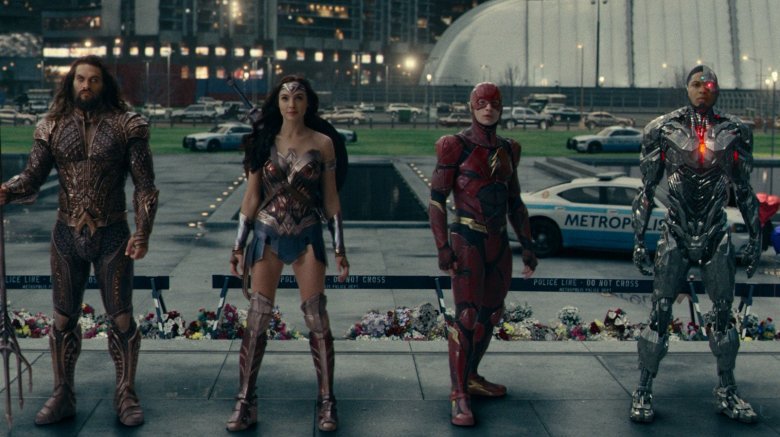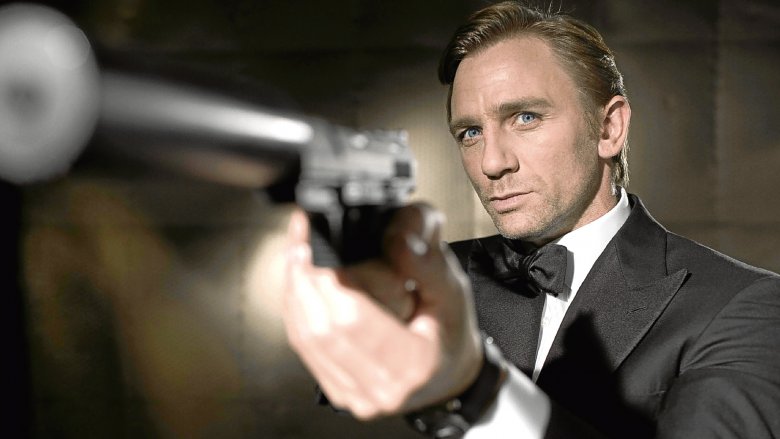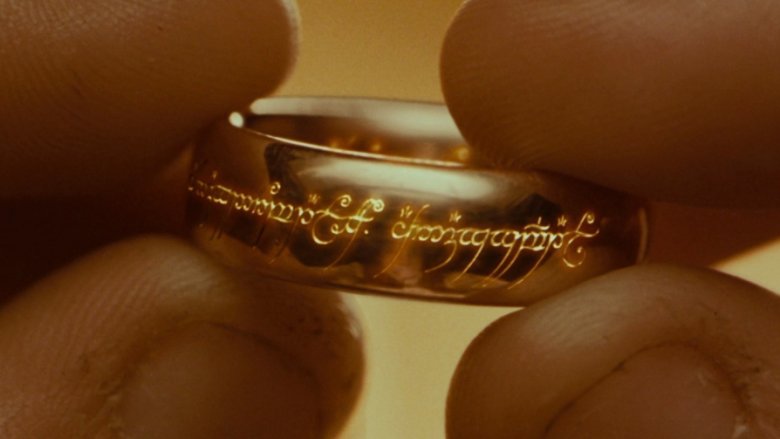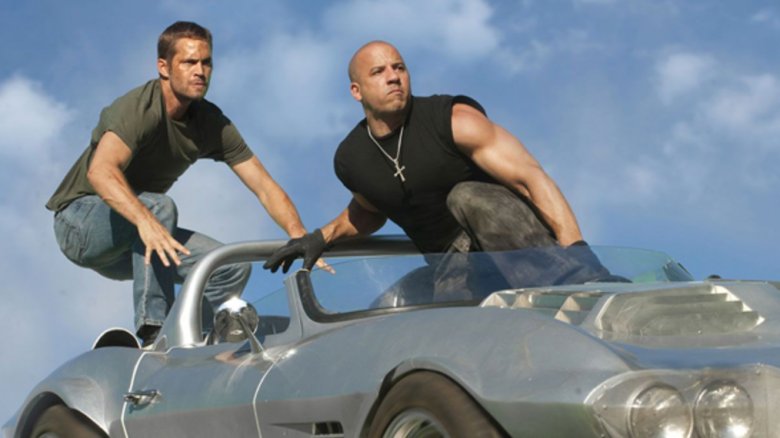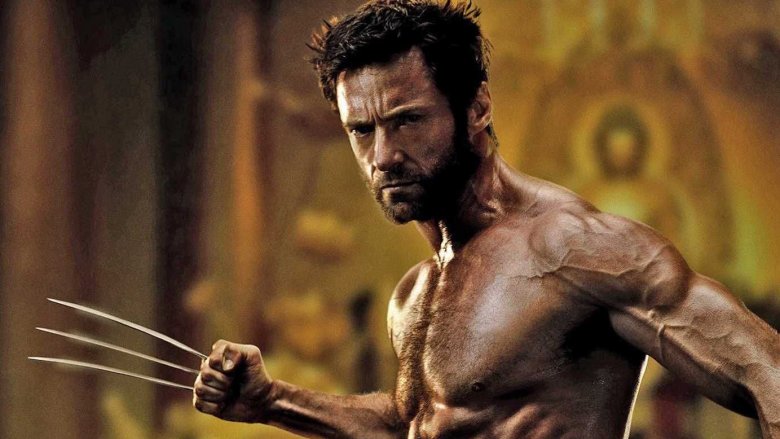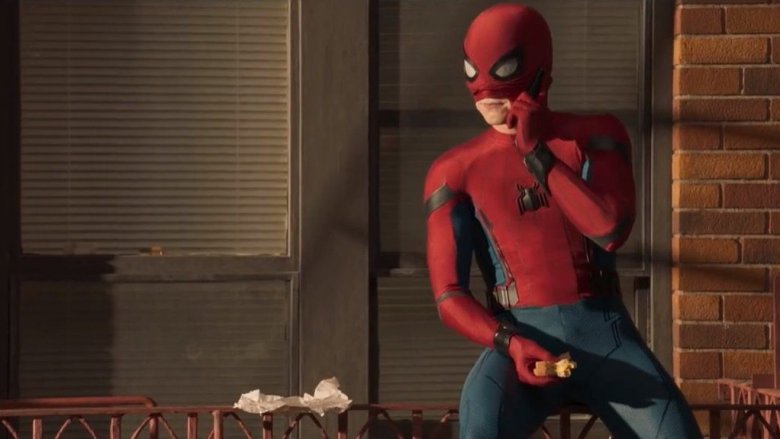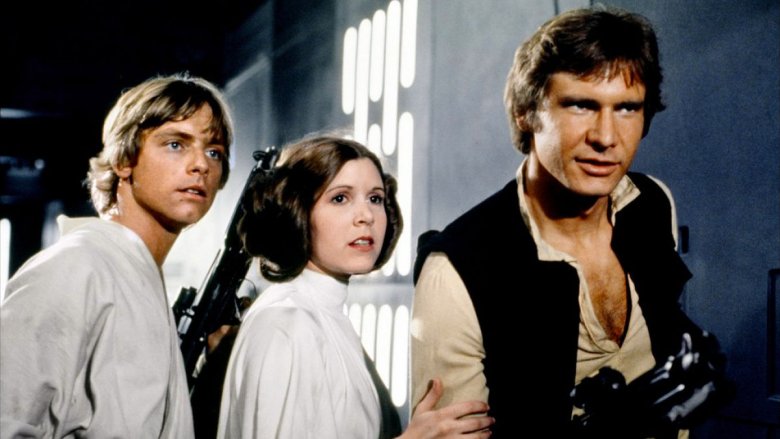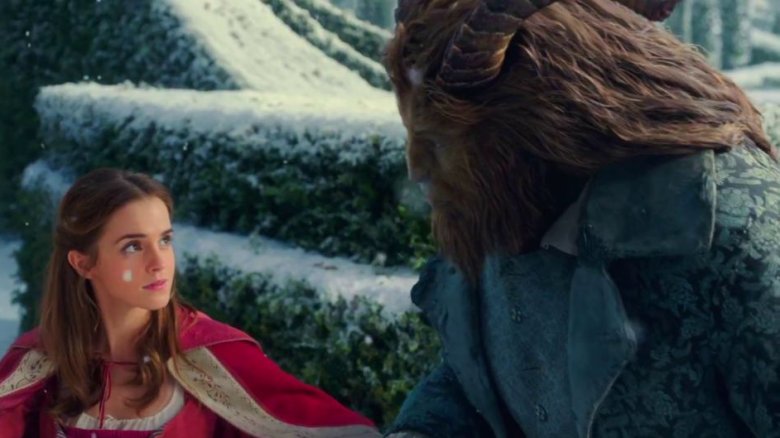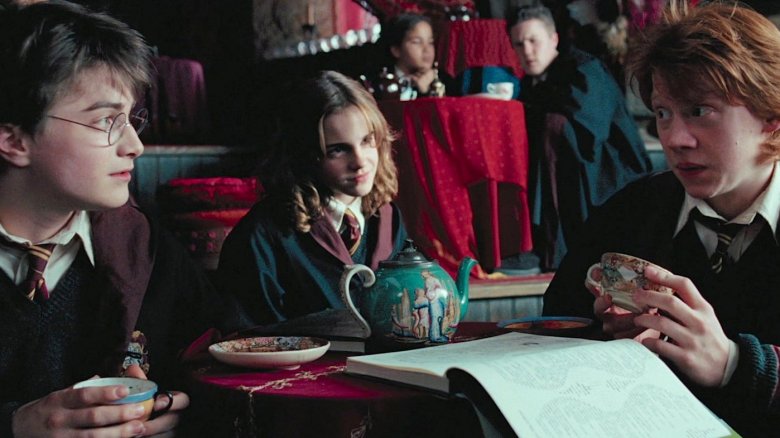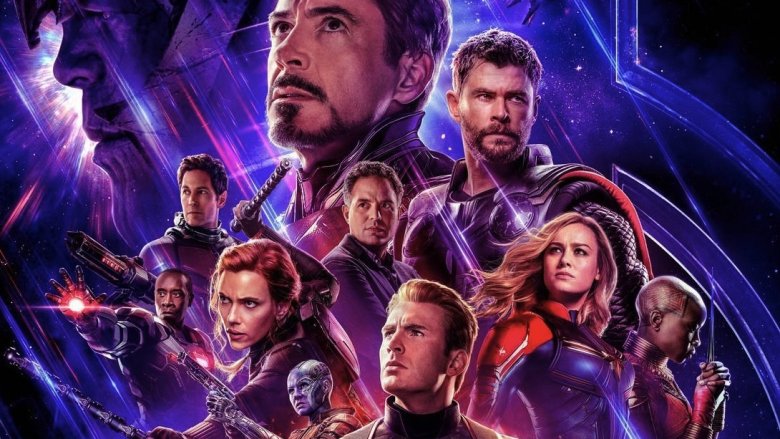The Most Successful Movie Franchises In Box Office History
When a major studio launches a franchise, the hope, of course, is that it will end up thriving both critically and commercially and lead to plenty of films, lots of fame, and a huge profit. Granted, not every franchise-to-be succeeds as planned, and unfortunately, Hollywood is full of failed series like John Carter, Green Lantern, and The Golden Compass.
However, that's not to say the risk isn't worth it. There are plenty of major franchises that have spawned films, TV shows, amusement park attractions, and more. And it's these massive series that keep audiences in theaters and Hollywood going strong, especially when the movies rake in billions upon billions of dollars. But which series have earned the most money? Which ones have made history and stacks of cash? Well, from superhero films and boy wizards to otherworldly space adventures, here are some of the most successful franchises in box office history.
Pirates of the Caribbean sailed to box office success
When the Pirates of the Caribbean franchise officially launched in 2003 with its first film, Curse of the Black Pearl, it seemed like unlikely the movie would be a success. After all, who would ever think that a movie based on a theme park ride would prove to be such a phenomenon? However, thanks to an essential leading performance by Johnny Depp as Captain Jack Sparrow (a role for which he'd earn his first-ever Academy Award nomination), a healthy sense of humor, and thorough world-building, a true franchise was born, and it's been sailing along ever since.
The first film was beloved by fans and critics alike, but unfortunately, as the franchise has continued, each film has been met with diminishing critical returns. In the aftermath of Black Pearl, four sequels have been released — 2006's Dead Man's Chest, 2007's At World's End, 2011's On Stranger Tides, and 2017's Dead Men Tell No Tales — and each one has faltered with critics, with Dead Men Tell No Tales earning the lowest Rotten Tomatoes score of the entire series. And yeah, the box office has been dropping over the years, too, but the movies have still made an impressive haul, earning a worldwide total of $4.5 billion, which just proves that Captain Jack Sparrow still has what it takes to draw in fans.
Batman is the franchise we deserve
Gotham's brooding, mysterious Caped Crusader has seen plenty of reboots over the years, and it's clear that audiences will tune in no matter who's playing Batman or which director is taking on this familiar tale. After showing up in a cheesy yet fun film in 1966, Batman got his own blockbuster in 1989, directed by Tim Burton. With Michael Keaton in the leading role, the popular and well-received film earned itself a sequel, Batman Returns. After Keaton's run, Val Kilmer donned the suit and mask in Batman Forever, directed by Joel Schumacher, but unfortunately, the director's follow-up effort with George Clooney, Batman & Robin, was completely panned by critics.
However, in 2005, Christopher Nolan took the reins of the franchise, reinvigorating the character by casting Christian Bale as Bruce Wayne and re-introducing his origin story in Batman Begins. Three years later, The Dark Knight hit theaters and became an instant sensation, thanks to a gripping narrative and career-defining performance by the late Heath Ledger as the Joker (who would go on to win a posthumous Oscar). Nolan's trilogy closed out in 2012 with The Dark Knight Rises, setting box office records — both Dark Knight films made over a billion dollars each — as well as a new standard for any future Batman films. Between the trilogy and other films like the cheeky LEGO Batman Movie, the franchise has earned $4.9 billion worldwide.
The DC Extended Universe is making money despite the critics
Marvel and DC have spent years battling each other at the box office, and when the Marvel Cinematic Universe proved to be a rousing success, DC introduced the DC Extended Universe (the DCEU). The franchise kicked off in 2013 with Man of Steel, a Superman film with Henry Cavill at the helm, and three years later, DC got back into the Batman game with Batman v Superman: Dawn of Justice, where Cavill faced off against Ben Affleck's Batman (a casting decision which proved to be pretty unpopular). As DC built up its film universe, more standalone films followed, including Wonder Woman, Suicide Squad, Aquaman, Shazam!, and of course, Justice League, which brought Batman, Wonder Woman, Aquaman, and Superman together in 2017.
However, while the MCU has achieved both critical and commercial success, the DCEU has proven to be more uneven. As far as critical responses go, a significant portion of the films have faltered, including Suicide Squad, Batman v Superman: Dawn of Justice, and Justice League. However, outings like Wonder Woman, Shazam!, and Aquaman (the highest-grossing DC film) have fared much better, giving the DCEU a blueprint of what tactics to employ as it moves forward. However, mixed reviews haven't really affected its financial success. The fledgling franchise has grossed $5 billion at the worldwide box office.
The name's Bond, James Bond
Stories about spies will pretty much always please moviegoers, and as far as one particular debonair super spy is concerned, audiences will likely never get tired of his exotic, international exploits. Based on a series of novels by British author Ian Fleming, the incredibly long-running James Bond series has been a bona fide hit since 1962 with its first film, Dr. No. Throughout the years, one of the signature aspects of the films is that the actor who plays Bond has changed multiple times. Plenty of actors have given iconic performances as 007, from Sean Connery to Timothy Dalton to Daniel Craig, with each performer spending a few films in the role before passing the mantle down.
Characterized by high-octane action sequences, enviable gear from suits to watches to cars, and plenty of martinis, the Bond series is a Hollywood tentpole, keeping audiences captivated for decades while still remaining impossibly relevant. Over the years, it's also remained incredibly consistent at the box office, likely thanks in part to the constantly shifting lead role — after all, with so many actors donning Bond's suit, the series never gets stale or boring — earning a worldwide total of $5 billion.
Middle-earth is a fantastical franchise
J.R.R. Tolkien's epic fantasy novels, The Lord of the Rings, have been universally adored since he first started publishing them in 1954, but for years, a film adaptation of these sprawling, enormous stories seemed out of reach in every possible sense, from logistics to finances. Finally, in 2001, director Peter Jackson embarked on his own enormous journey, filming all three installments — The Fellowship of the Ring, The Two Towers, and The Return of the King — for over a year on location in New Zealand, assembling a spot-on cast and using the remote country's natural beauty to incredible effect.
Released over three years, the films performed massively well at the box offices and were beloved by critics and fans, even winning a whopping 11 Academy Awards for The Return of the King, which closed out the original trilogy in 2003. Ultimately, Jackson released mega-sized extended editions of each film so fans could explore his world even further.
Years later, Jackson returned to New Zealand to helm The Hobbit franchise, which was based on Tolkien's original prequel novel. The ensuing films, which formed a trilogy of their own — An Unexpected Journey, The Desolation of Smaug, and The Battle of the Five Armies — performed well at the box office, though critics didn't feel they captured the same magic as the original Lord of the Rings films. All told, however, the entire Middle-earth franchise swept the box office with over $5.8 billion in total worldwide.
The Fast and the Furious raced to international success
Trafficking in cinematic camp, high-speed car chases, plenty of action, and a core cast, the Fast and the Furious franchise has remained a box office juggernaut since it officially kicked off in 2001 with The Fast and the Furious. Throughout eight films, audiences have loved watching their favorite gang — which includes actors like Vin Diesel, Michelle Rodriguez, Jordana Brewster, Tyrese Gibson, Dwayne Johnson, Ludacris, Gal Gadot, Sung Kang, and the late Paul Walker — race their way through dire situations and evade the law, all while surrounded by plenty of incredible cars.
The franchise has spanned cities from Los Angeles to Miami to Tokyo, and during its tenure, it's transitioned from focusing on underground speed racing to elaborate heists. Unfortunately, tragedy halted the films in 2013 during the shooting of Furious 7. Walker was killed in a car accident, which delayed the filming process, but after several rewrites and adjustments, the film was released in 2015 (and was, of course, dedicated to Walker).
Though more Fast and Furious films are still on the way, the franchise has branched out into spin-offs since Furious 7, with Hobbs & Shaw (which was led by Johnson and Jason Statham). Clearly, this franchise just keeps succeeding no matter what, raking in a worldwide total of $5.8 billion over the years.
The X-Men have long fought for their place at the box office
A Marvel property that's existed in a separate sphere from the Marvel Cinematic Universe, the X-Men film series had a tumultuous ride over 12 movies, with plenty of ups and downs before Disney came along and bought the property (along with 20th Century Fox itself). The first film, X-Men, was released in 2000 under Bryan Singer's direction, and thanks to sharp casting (in particular, Hugh Jackman would go on to inhabit the role of Wolverine for years to come) and a gripping story, it spawned a franchise about a group of superpowered mutants, shunned by human society, who must make their way in an increasingly dangerous world.
The original film saw plenty of sequels — including the popular X-Men: First Class and X-Men: Days of Future Past — and many new cast members over the years, but the franchise hit more than a few critical roadblocks, with X-Men: The Last Stand, X-Men Origins: Wolverine, and X-Men: Apocalypse. However, the series would redeem itself with well-received spin-off efforts like the Deadpool films (which marked a huge career comeback for star Ryan Reynolds) and the critically beloved Logan (which marked Jackman's final turn as Wolverine), but it stumbled hugely once again with Dark Phoenix, a standalone led by Game of Thrones breakout star Sophie Turner. With that all said, one place the X-Men series has rarely faltered is at the box office, scoring a whopping $6 billion total worldwide.
The Spider-Man series swung its way into our hearts
Throughout his years on screen, New York's friendly neighborhood web-slinger has gone through more reboots than ever seemed possible, appearing in three different live-action iterations over a relatively small timeframe. In 2002, Sam Raimi got things started with Spider-Man, which starred Tobey Maguire as Peter Parker and spawned two sequels, but in 2010, Sony made the unexpected announcement that the entire franchise would be rebooted with a new star. With director Marc Webb at the wheel, Spidey returned to the big screen in the form of Andrew Garfield, but after two Amazing Spider-Man films, Garfield was set aside, and the entire franchise shifted once again.
Enter Tom Holland, a young British actor who arrived just in time for Spider-Man to rejoin the Marvel Cinematic Universe thanks to a temporary deal between Sony and Disney. After a debut in Captain America: Civil War, Holland played Spider-Man in two standalone films (Homecoming and Far From Home), as well as two ensemble Avengers films (Infinity War and Endgame), but even though those five films ended up being some of the most popular and profitable efforts in cinematic history, Marvel lost the character once again after Disney and Sony couldn't reach an agreement over his future financial prospects. However, between all of Spider-Man's live-action exploits and Sony's Academy Award-winning animated feature, Spider-Man: Into the Spider-Verse, Spidey's franchise is pretty profitable for whomever can snare him, earning a worldwide total of $6.3 billion.
Star Wars is the OG of money-making franchises
In 1977, director George Lucas introduced audiences to a galaxy far, far away, and the world hasn't been the same since. The first Star Wars film took audiences by storm, and the original trilogy — A New Hope, The Empire Strikes Back, and The Return of the Jedi — is still regarded as one of the best sets of movies ever made. After the trilogy made international stars out of Harrison Ford, Mark Hamill, and Carrie Fisher, it was an inevitability that the Star Wars universe would continue. Although it took nearly two decades, a series of Star Wars prequels was released, but this proved to be a bit of a misstep. The Phantom Menace, Attack of the Clones, and Revenge of the Sith kept up Star Wars' tradition of strong showings at the box office, but critics and longtime fans alike derided the films.
Wisely, Disney and Lucasfilm decided to wait a little longer before messing with Star Wars again, keeping diehard followers happy with video games, novels, comic books, and the TV series The Clone Wars before branching back out into films. The final Skywalker saga has succeeded thus far with The Force Awakens and The Last Jedi, both of which performed well critically and commercially (with the final film, The Rise of Skywalker, arriving in December 2019). Counting spin-offs like Rogue One and Solo, the franchise has raked in an astonishing $9 billion at the worldwide box office, as well as over $30 billion in merchandising.
The Disney Live Action remakes use nostalgia to earn tons of cash
Apparently, it wasn't satisfying enough for Disney that it created some of the most beloved animated films of all time, including The Lion King, Beauty and the Beast, The Little Mermaid, and Cinderella. In 2015, the studio launched a new era and started reimagining its classic films, kicking things off with Maleficent, a re-telling of Sleeping Beauty from the villain's perspective. However, Disney's first foray into straight-up remakes was Jon Favreau's 2016 hyper-realistic live action adaptation of The Jungle Book. Since then, the company has gone back to basics and adapted several of its films, and though the results have varied critically, these live-action movies have succeeded commercially.
The live-action remake of Beauty and the Beast, for one, was a box office smash, crossing the billion dollar threshold and making its mark as the second most profitable film of 2017. Though other films like Kenneth Branagh's Cinderella, Tim Burton's Dumbo, and Guy Ritchie's Aladdin performed well at the box office, Beauty and the Beast held the top spot until it was dethroned by Jon Favreau's star-studded remake of The Lion King in 2019. Though the film faltered critically, it crushed the box office, scoring the biggest opening for an animated film and earning $1.6 billion. Ultimately, this particular leg of Disney has earned over $9 billion at the worldwide box office, and it will likely keep succeeding as they continue taking audiences down memory lane.
Harry Potter cast a spell over everyone
When the first book in J.K. Rowling's Harry Potter series, Harry Potter and the Philosopher's Stone (renamed Sorcerer's Stone for North American audiences), hit bookshelves, it was an instant hit, immediately becoming one of the biggest literary sensations of all time. Naturally, that led to a hugely successful film adaptation.
For a decade, the Harry Potter franchise captivated audiences at the box office, spanning eight films (the final installment, Harry Potter and the Deathly Hallows, was split into two films), but even when the original series concluded, there were apparently still more stories to tell that went beyond Harry and his friends' adventures at Hogwarts School of Witchcraft and Wizardry.
After her final Potter novel was released in 2007, Rowling spent the aftermath creating more and more Harry-related content, including the online encyclopedia and interactive website Pottermore. Soon, Potter properties started popping up everywhere, including a theme park at Universal Studios. Then, in 2016, Rowling expanded the film franchise even further, adapting her own textbook, Fantastic Beasts and Where to Find Them, for the big screen. With Eddie Redmayne taking the leading role of Newt Scamander, this new arm of the franchise will ultimately span five films, the first two of which have already been released (The Crimes of Grindelwald hit theaters in 2018). All in all, the Potter franchise has earned over $9 billion worldwide, making it one of the most successful film franchises in history.
The Marvel Cinematic Universe is the most successful franchise of all time
When you think of uber-franchises, your mind probably goes right to the Marvel Cinematic Universe and with good reason. Ever since it officially launched with the release of Iron Man in 2008, the MCU has dominated the box office, the news cycle, and the overall conversation when it comes to the gold standard of superhero films. Split into a series of separate phases, the MCU has produced some of the biggest, most beloved, and most financially successful comic book adaptations in film history.
Though the pre-MCU Marvel films had some bright spots, they also had plenty of misses. For every Spider-Man, there was an Elektra or Fantastic Four. But the MCU bucked that trend with charismatic characters and talented actors like Robert Downey Jr. and Chris Evans. Eventually, the MCU pulled off several crossover films, and the shared universe-based franchise soared to the top of the pack. Since then, the MCU has expanded into television projects, as well, making its mark on screens of every size. (The MCU's signature healthy sense of humor and whimsy doesn't hurt, either.) Thanks to box office juggernauts like Avengers: Endgame, which helped to close out Phase Three and did away with a few superheroes to pave the way for new stories, the MCU has made over $22 billion worldwide ... and counting.
